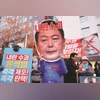By Soo-Hyang Choi and Sangmi Cha
South Korean President Yoon Suk Yeol managed to avoid impeachment over the weekend by just a handful of votes. But pressure for him to step down is only intensifying.
With mounting public anger in Seoul and Yoon’s approval rating nearing single digits, his allies huddled on Sunday to find a way for him to quietly step aside. They want the president to go away without needing to vote for his impeachment, a move that could upset supporters and hurt the party in a subsequent election.
That search for a creative solution prompted Han Dong-hoon, the leader of Yoon’s People Power Party, to declare on Sunday that Prime Minister Han Duck-soo would manage the nation’s affairs from now on, including managing the nation’s security alliance with the US.
“The president will not be involved in any state affairs including diplomacy before his exit,” Han Dong-hoon told reporters on Sunday.
Also Read
The opposition immediately rejected the move, with Democratic Party leader Lee Jae-myung accusing Yoon’s party of “destroying the order of the constitution.”
“Isn’t this another coup?” Lee said after the announcement, adding that his party would again push for the president to step down. “I urge Yoon Suk Yeol to immediately step down or to be impeached.”
Potentially worse for the president, Yonhap News reported Sunday that the South Korean Prosecutors’ Office opened a treason investigation into Yoon over his declaration of martial law last week. If he’s eventually found guilty, a process that could take months or years, he could face life in prison or even death.
The political drama is roiling markets and distracting South Korea at a crucial time. The export-reliant nation faces new tariff warnings from US President-elect Donald Trump and increased threats to its security as North Korea strengthens its military alliance with Russia.
The outcome will have economic and strategic ramifications. Yoon’s conservatives advocate pro-business policies and a tough stance on Kim Jong Un’s regime, while the opposition favors a softer line on North Korea, more cash handouts for citizens and higher taxes for the nation’s wealthiest corporations, known as chaebol.
South Korea also needs to agree on a budget by the end of the month. Yoon cited the wrangling over spending, along with a series of impeachment motions against government officials, to justify his attempt to use the military to shut down parliament for the first time since South Korea became a democracy four decades ago.
Korea’s equity benchmark Kospi has fallen nearly 3% since the short-lived martial law decree, with significant intra-day swings on Friday as traders weighed the political developments. The market is expected to be volatile again on Monday.
Political paralysis will hurt an economy already suffering from slowing growth, even though the Finance Ministry and the Bank of Korea will prevent a more destabilizing crisis, Eurasia Group said in a report on Sunday. It added that “strikes and more violent forms of dissent” are likely in addition to swelling demonstrations.
“Protests will only get bigger from now,” said Eom Kyeong-young, a former government official who is now director of the Zeitgeist Institute, a research group in Seoul. “I doubt the government and the ruling party will be able to withstand the pressure for long.”
On Saturday, Yoon made his first comments since rescinding martial law, apologizing for the move and promising he would accept legal and political responsibility. He also vowed not to declare martial law again.
Later that night, with demonstrators braving freezing temperatures, parliamentarians met to impeach the president. Although the opposition needed just eight of 108 lawmakers in Yoon’s party to switch sides, the motion failed after the conservative camp largely stuck together in boycotting the vote.
Now, with the opposition threatening to continue bringing impeachment motions until they pass, the conservatives are looking for Yoon to go while putting them in the best position to win an election that must take place 60 days after he leaves office.
That dilemma has led to flip-flopping by the ruling party leader Han Dong-hoon, who initially opposed impeachment before saying Friday that Yoon should be suspended from duty. On Sunday, Han Dong-hoon said that an “orderly exit” is better than impeachment.
How that would work is still unclear. The constitution allows the prime minister to assist and carry out the orders of the president, who would legally still be in charge until his duties are suspended or he’s removed from office.
“If the president changes his mind, he can act otherwise,” said Shin Yul, a political science professor at Seoul’s Myongji University. “I doubt people would accept the plan.”
The criminal proceedings could also take awhile to play out.
After the complaint is accepted, then Yoon would have to be charged and potentially arrested. Yet even if he’s detained and put on trial, he would remain president until the Supreme Court confirms his conviction, according to Lee Changhyun, a criminal law professor at the Hankuk University of Foreign Studies Law School.
“Of course, he will be pardoned once the administration changes,” Lee Changhyun said.
The clock is also ticking for the Democratic Party’s Lee Jae-myung, who was the most favored person to succeed Yoon in a Gallup Korea poll last week. A Seoul court convicted him last month of violating election laws, and he would be ineligible to stand for the presidency if a conviction against him is upheld. A ruling on his appeal may come around May.
Much now depends on what happens on the streets. Police estimated at least 100,000 people were gathered near the parliament to demand Yoon’s impeachment on Saturday, compared with 18,000 Yoon supporters gathered in another part of town, according to Yonhap News.
Park Hye-rim, 33, spent hours at the protest and vowed to fight on no matter what.
“Even if impeachment is voted down, I will come back to rally again and again,” she said. “I will not give up.” ©2024 Bloomberg L.P.

)
